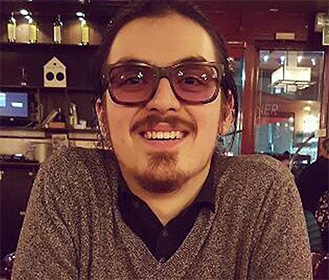Student profile: Joe Davies – PASS Mentee, Mentor and Student Organiser
As part of our Peer Assisted Study Support (PASS) scheme spotlight, part of the wider student services spotlight series, Joe Davies shares his experience of being both a PASS mentee and mentor, as well as student organiser and what these roles entail.

Joe Davies
Take us through your experience with the PASS scheme and the roles that you’ve had over the past years
I study theoretical physics, and in first year I was a mentee because although I have a good knowledge of my subject, I do sometimes require more work to get to that point. I knew that something like PASS would help me out because they can take you through things a bit slower, whereas lecturers have to whizz through a bunch of different topics in one class. I turned up nearly every week to get assistance with my coursework, and also just to work there.
When second year rolled around and I heard that they were looking for new mentors, I thought it was a great chance to consolidate my learning, as having to explain a topic to someone else forces you to understand it better yourself. I took to it like a duck to water. It felt really good to explain stuff that I’d only just learned myself to people who were having trouble understanding it.
I received recognition as PASS Mentor of the Year for my work in second year, which really made me resolve that mentoring was something I should keep doing. Mentoring in third year was great, and actually threw up its own set of challenges; each year brings a new student with different learning capabilities, so you have to change your approach to working with each mentee. This year’s my fourth year, so I’m doing my masters but I’m still participating in the role of student organiser.
What does that entail?
It’s fairly similar to being a mentor, but I do the admin work and organisation of the scheme: room bookings, registration, and general planning. I organised a revision session during reading week, so I had to gauge interest and see who was interested in attending, which mentors would be available, and organise the session. The role of student organiser means taking on all of the organisational aspects of the scheme.
When you were a mentee, was there a time you asked a mentor for help around exam support or essay support?
Within my course there’s a module about the programming language C++, which is an introduction to programming. Elements of that are quite difficult because it’s like learning a new language. I did ask for help with that, and also I think a lot of it for me was worrying that the marks I was receiving in my coursework would be reflected in my exam results. There were specific parts of modules that were incredibly difficult, so it was reassuring to be able to ask an older student whether things got easier with time and practice. Predominantly I was there for my coursework but there would also be times where I would check my understanding of what the exam would be and to ask for help with revision tactics. They were really good at helping me with this.
Do you think your experience as a mentee helped with the mentoring side of things?
There’s kind of a running joke within physics that as soon as the students come in each week we know exactly which question they’ve all got. We’ve all been to the same classes ourselves, so we know the kinds of questions that are going to come up. Having been a mentee also means that I know where someone’s coming from when they ask me a vague, broad question or struggle to express what their problem is, because I had the same questions at that time as well. So I do think it’s easier to start out as a mentee, in terms of being able to put yourself into their shoes.